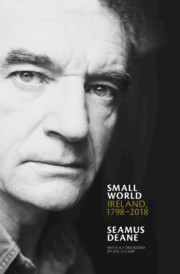Book contents
- Small World
- Small World
- Copyright page
- Dedication
- Contents
- Foreword
- Permissions
- Acknowledgements
- Chapter 1 Swift as Classic
- Chapter 2 Burke in the USA
- Chapter 3 Tone: The Great Nation and the Evil Empire
- Chapter 4 Imperialism and Nationalism
- Chapter 5 Irish National Character 1790–1900
- Chapter 6 Civilians and Barbarians
- Chapter 7 Heroic Styles: The Tradition of an Idea
- Chapter 8 Ulysses: The Exhaustion of Literature and the Literature of Exhaustion
- Chapter 9 Dead Ends: Joyce’s Finest Moments
- Chapter 10 Elizabeth Bowen: Sentenced to Death
- Chapter 11 Elizabeth Bowen: Two Stories in One
- Chapter 12 Mary Lavin: Celibates
- Chapter 13 Emergency Aesthetics
- Chapter 14 Wherever Green is Read
- Chapter 15 The Famous Seamus
- Chapter 16 The End of the World
- Index
Chapter 7 - Heroic Styles: The Tradition of an Idea
Published online by Cambridge University Press: 03 June 2021
- Small World
- Small World
- Copyright page
- Dedication
- Contents
- Foreword
- Permissions
- Acknowledgements
- Chapter 1 Swift as Classic
- Chapter 2 Burke in the USA
- Chapter 3 Tone: The Great Nation and the Evil Empire
- Chapter 4 Imperialism and Nationalism
- Chapter 5 Irish National Character 1790–1900
- Chapter 6 Civilians and Barbarians
- Chapter 7 Heroic Styles: The Tradition of an Idea
- Chapter 8 Ulysses: The Exhaustion of Literature and the Literature of Exhaustion
- Chapter 9 Dead Ends: Joyce’s Finest Moments
- Chapter 10 Elizabeth Bowen: Sentenced to Death
- Chapter 11 Elizabeth Bowen: Two Stories in One
- Chapter 12 Mary Lavin: Celibates
- Chapter 13 Emergency Aesthetics
- Chapter 14 Wherever Green is Read
- Chapter 15 The Famous Seamus
- Chapter 16 The End of the World
- Index
Summary
It is possible to write about literature without adverting in any substantial way to history. Equally, it is possible to write history without any serious reference to literature. Yet both literature and history are discourses which are widely recognized to be closely related to one another because they are both subject to various linguistic protocols which, in gross or in subtle ways, determine the structure and meaning of what is written. We have many names for these protocols. Some are very general indeed – Romanticism, Victorianism, Modernism. Some are more specific – Idealist, Radical, Liberal. Literature can be written as History, History as Literature. It would be foolhardy to choose one among the many competing variations and say that it is true on some specifically historical or literary basis.
- Type
- Chapter
- Information
- Small WorldIreland, 1798–2018, pp. 133 - 148Publisher: Cambridge University PressPrint publication year: 2021

